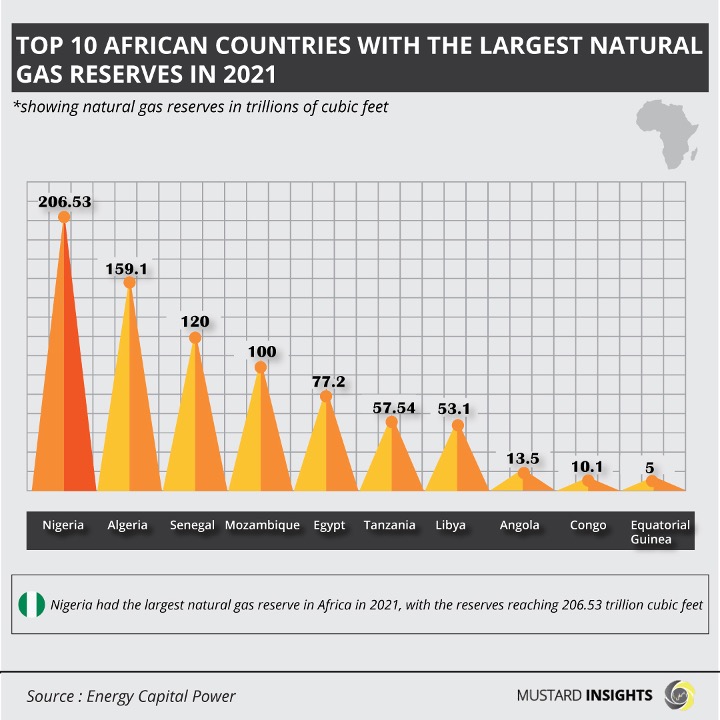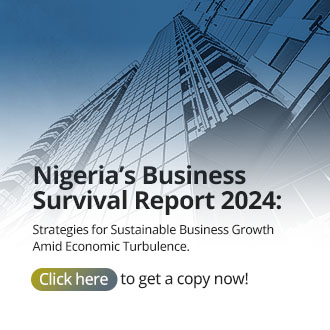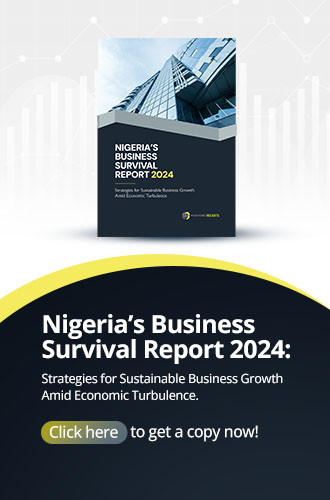A select number of African countries presently have still untapped gas reserves totaling trillions of cubic feet of natural gas. Nigeria leads the way, with the West African oil giant presently sitting on 206.53 trillion cubic feet of natural gas, per the Africa-focused energy investment platform, Energy, Capital, & Power, and the country’s Department of Petroleum Resources (DPR).

The advent of the Russia-Ukraine conflict saw sanctions imposed by some countries on the purchase of gas products from Russia. This affected gas markets around the world; in 2021, Russia was the largest exporter of natural gas in the world. Per Statista, the country exported 8.52 trillion cubic feet of natural gas in 2021, exporting 7.12 trillion cubic feet of gas via pipelines and an additional 1.40 trillion cubic feet as liquefied natural gas (LNG) via ships.
The European Union in particular has been heavily dependent on Russian gas; the region imported 155 billion cubic meters of gas from Russia in 2021, accounting for nearly 45% of all imported gas into Europe. Countries like Estonia, Finland, Bulgaria, and Latvia all depended on Russia for as much as 95% of their entire gas imports. European giants like Germany and the Netherlands had spoken repeatedly about the need to reduce the EU’s dependence on Russia. These proclamations have proven to be rather prescient; the conflict and the sanctions it brought created an energy crisis in Europe. In exacerbation, Russia’s insistence that all importers pay for gas in rubles, along with the sabotage of the Nord Stream 2, have meant that Europe has had to look elsewhere for gas. This is where Africa stands to profit.
A select number of African countries presently have still untapped gas reserves totaling trillions of cubic feet of natural gas. Nigeria leads the way, with the West African oil giant presently sitting on 206.53 trillion cubic feet of natural gas, per the Africa-focused energy investment platform, Energy, Capital, & Power, and the country’s Department of Petroleum Resources (DPR). This means the country presently has the eight-largest natural gas reserves in the world. The country’s large coastline allows it to be a big player in the LNG market.
On the continent’s western coast, Senegal, Angola, Equatorial Guinea, and Cameroon also have large gas reserves, with 120 trillion, 13.5 trillion, 5 trillion, and 4.8 trillion cubic feet respectively. All these countries are presently developing installations to produce and export LNG, with the Senegal/Mauritania Grand Tortue Ahmeyin (GTA) gas project set to take advantage of the nearly 100 trillion cubic feet-gas field.
Africa’s east coast, more primed for export to the Asian continent, also possesses major gas reserves. Mozambique presently holds 100 trillion cubic feet of natural gas, an amount able to meet the country’s annual consumption 1,546 times over. Tanzania and Sudan also possess 57.54 and 3 trillion cubic feet respectively. The more central Republic of the Congo presently has 10.1 trillion cubic feet of natural gas in reserve.
North Africa may be in the most advantageous position with respect to exports to Europe, with the region close enough to transport gas via pipeline to the European continent. Algeria’s 159.1 trillion cubic feet of gas reserves is highest in the region, 11th in the world, and second only to Nigeria in Africa. The country also has the advantage of being able to send gas directly to Europe, with the MedGaz pipeline which links the country to Spain. Egypt possesses 77.2 trillion cubic feet in gas reserves, with the country being Africa’s largest gas consumer. It also possesses two large LNG facilities, from which it ships directly to Europe. Libya, a major oil producer, presently has 53.1 trillion cubic feet of untapped natural gas.
With Europe seeking to diversify its supply, Africa stands to take advantage. The countries involved need to develop producing and exporting facilities, as this is presently the major obstacle. If they can, the pathway to significant income via exports and internal economic development becomes clear.
Thoughts?
We won't share your email address. All fields are required.
